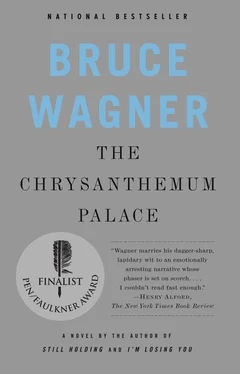I was on the toilet when the phone rang.
I heard her gasp, then came back to the room and listened.
Jack Michelet was dead.
THE FUNERAL WAS AT MARTHA’SVineyard. Thad begged Clea to come and she, in turn, begged me. She needn’t have: I knew Miriam would be going and I was very sexed up. To be perfectly frank. Besides, life had become a dull shuttle between AA meetings, the gym, Starwatch tapings, and reluctant dinner dates — I looked forward to a geographical break in routine, especially one promising to be historically memorable. (OK, half that is bullshit. What I wanted was more Miriam, and the sooner the better.) When Dad found out I was going, he was actually jealous.
The burial took place on Saturday, 1amid bright sun and nipping cold while the salty seawater, ever near, rhythmically murmured the Lord giveth… the Lord taketh away. Thad was supposed to have arranged a car but it never showed so we cabbed it to a charming B&B where, remarkably, our rooms were still being held. (The island was completely booked.) Michelet’s death was an international event and the presence of journalists and paparazzi permeated the Vineyard, lending a cockeyed, festive, Dia de los Muertos vibe. Thad’s mother hired a cadre of Secret Service types to fend off media vultures already circling the cemetery’s entrance. They wore earpieces and sharp Brioni suits.
As a novice drawn to the “set piece,” I was sorely tempted to begin this diary with the great man’s interment (remember The Bad and the Beautiful? ), though am happy now to have throttled the impulse, being fairly sure I’d have botched it — a pastiche of eulogies would have been a regrettable launch for these modest pages. Comments from the makeshift podium seemed par for the posthumous course: from the heart, the head, the ego, the groin. Hardly anyone was sober and the ones who were, for all the cringeworthiness of their remarks, may as well have been stoned to the gills. It does seem fairly harmless, though, to list a small roster of mourners: ancient mariners Styron, Mailer, Vonnegut and Vidal, with Hitchens, Auster, Wallace and Lethem representing the new. A half-dozen unlikely showbiz types paid homage as well: Sumner Redstone, Ron and Ellen Perelman, Steve Martin (Joyce Carol Oates on his arm!), Jim Belushi, Daryl Hannah and Carly Simon (I assumed the last three were neighbors). And last, but not least, Nicole Kidman, willowy, alabastrine, and regal red. Supposedly she had optioned Michelet’s penultimate book.
I became separated from my group and stood sheepishly on the fringe, bending an ear to discern the minister’s words as the wind kicked up, with that nagging outsider feeling — wondering why I’d come.

The Michelet compound bore a sandy, legendary rusticity, still soaked, so to speak, in the cologne of its erstwhile emperor.
I actually recognized it from an Architectural Digest feature some years ago. The amicable gathering of houses, barns, and famously rock-bound, stand-alone study — the latter studiously avoided by downcast minions while they circulated, as if Jack Michelet might still be inside, hard at work — achieved an astonishingly poignant feng shui in its placement on the promontory. The smoky remnant of day, with memorial winds blowing warm enough from sea to bluff that brought to mind my own cherished Santa Anas, gave me gooseflesh. A splendiferous, production-designed dusk made everything reassuringly golden and as evening fell the overall mood lightened; meaning, the crowd openly brandished whatever preferred weapons of choice had gotten them through a collective thirty-five centuries of lusty, wigged-out, existential nights and jaundiced, penitential, hungover days. Miriam and I found a torchère-lit corner to have our first kiss since the Chateau idyll. That neither Clea nor Thad knew about it made postmortem intimacies all the sweeter.
Alone again, I looked suspiciously out of place. Whenever I got the nascent evil eye (on tap for potential media gate crashers), I very publicly touched base with Clea or Miriam to make myself official. Once the security boys pegged me as kosher, I was free to roam the house, dipping into this room or that, or zipping to the patio bar — I was chaining Diet Cokes — stooping beneath a tree to light up, hands cupped à la James Dean while little gusts flared to put out my flame. The cliché is true: there’s nothing like a funeral to make one feel alive.
In wood-paneled rooms were portraits of the old dead king in sundry luxe-framed inaugurations. For the last four decades, he had that luxuriously photogenic shock of white hair befitting a Russian or Bolivian billionaire — I thought first of Derrida, then Gianni Agnelli, then finally, most perfectly, of Burt Lancaster. (Perhaps because I’d read somewhere that in his prime, Lancaster was the nastiest, toughest, most feared son of a bitch in Hollywood.) There were pictures of Jack and Morgana on yachts with society types, of black-tied Jack receiving this or that award of national or foreign commendation, of white-tied giant-killer with Jack ’n’ Jackie O — he’d written the first of his Pulitzer Prize — winning novels at just thirty years of age — a congery, a menagerie, an agglomerated panoply of silvery and kodachrome portraits: Jack with Hall of Fame rockers, world- and working-class saints and sinners, caretakers, — givers and corporate raiders, icons, poets and acolytes— Jack be nimble, Jack be quick —fools and royals and unwashed unknowns. While there were no recent images of the patriarch with his surviving son, I did manage to scope a shot of BJM posed, a tad uncomfortably it seemed, with the very young Thad (future third-rate novelist, classily idiosyncratic staple of big-screen blockbusters, and now our very own soon-to-be Starship ensign) aboard a rather grand little boat with The Soft Sea Horse written in elegant cursive on its prow, and I knew it predated the drowning. I wondered how the photo had lived; perhaps Morgana snatched it from one of the legendary bonfires.
I moved on, gamely attempting to unravel the riddle of a bronze plaque propped up against a soapstone Buddha. Why it had been memorialized, I would never know:
“Americans define Time as the space within which one succeeds or fails.”
— JACK MICHELET, JONAS AND THE WHALE
Fair enough.
And that was when I heard a ruckus.
I hurried to the hallway where Thad and his mom were tussling. He dogged her, disheveled and disgruntled, hissing as she retreated, drink sloshing in his glass like a cartoon of tiny breakers, full fingers five, vodka blown hither and thither by unseen tempests. Even at her age, Morgana had the upper hand physically, and emotionally too — it was no shrinking violet who’d managed to outjoust and outlive Mr. Giant-Killer. She continued to upbraid her son even as he remained on sodden attack though I couldn’t make out their timeworn, warm-spittled maledictions. Then Miriam appeared and scrimmaged between, allowing his mother, and a reconnoitering Brioni, an awkward exeunt.
The Kabuki-faced Morgana turned for a fierce parting shot.
“Your father could get away with it but you can’t. Miriam, you have got to help,” she implored. “Otherwise, I will have him removed. And boy, will they do it!” (The Brioni thugs.) “Oh, they’d love to.”
Once she vanished, Miriam and Thad were suddenly, unhappily aware of my presence. I scuttled to the kitchen where the widow, as if making a tardy stage entrance, breathlessly declaimed to those present (a few noshing, malingering guests plus two caterers): “The air was thin, the sky a scalding blue. The ambidextrous wind wisped clouds around like morphine — or venom — invading the blood.” She dutifully attributed the words to her late husband, addending whichever novel or poem as if it was scripture.
Читать дальше













